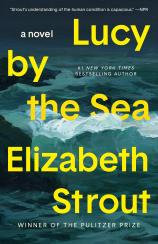Lucy by the Sea
Review
Lucy by the Sea
“What is strange as I look back is how I simply did not know what was happening.” This is Lucy Barton, describing those first few weeks of the pandemic, a time that seems so long ago and yet still so freshly strange. Living in New York City, her acquaintances sickening and some dying of the virus, she still resists her ex-husband William’s urgent entreaties that she leave the city with him. He has found a place on the coast of Maine for them to stay where they can quarantine. “Maybe just a few weeks,” he says. But as a parasitologist, he certainly knows better.
On the drive up to Maine, Lucy notices boxes of surgical masks and plastic gloves in the back seat. When she asks what they are, William says, “Don’t worry about it.” I wondered why he was treating her like a child. But as the novel continued, I remembered: Oh yes, this is Lucy.
“He seemed alarmist to me, and I do not like to be alarmed.”
“I hate the smell of other people’s lives.”
‘“I hate snow,” I said, and William said tiredly, “I know you do, Lucy.”’
William was probably trying to save his sanity, as well as his ex-wife’s life.
"Perhaps under the circumstances, an alternate title for this book might be 'Lucy at Sea.' But if so, I was delighted to be in a boat with querulous, compassionate, curious Lucy and her quirky family and friends."
But eventually Lucy faces both the horror and the banality of their situation. Their daughter Becka, who has remained in the city, tells them on the phone about the refrigerator trucks outside her apartment filled with bodies. “When we hung up I walked around and around the house. I did not know where to put my mind.” Lucy and William slowly settle into the restricted routine that will be familiar to many --- walks, meals at home, watching the news on TV, getting on each other’s nerves, staying masked and six feet from people not in their bubble.
Lucy is unable to write anything at first, but her curiosity about human beings is indefatigable. Even a ritual wave to a man always sitting on his porch as she walks by excites her. She strikes up a (socially distanced) friendship with Bob Burgess, who has rented William the home in which they’re staying. (Fans of Elizabeth Strout will recognize him from THE BURGESS BOYS.) For one thing, he tells her that he has read her memoir and thinks it’s about being poor and trying to cross class lines in this country, rather than about a deeply flawed mother and her daughter. “I couldn’t stop thinking about Bob Burgess. Oh, he had made me feel so much less lonely!”
Lucy also befriends a fellow food pantry volunteer named Charlene and is surprised to see a bumper sticker “for the current president of our country” on her car as she drives off. “I thought that was fascinating, it intrigued me, really.” And it strikes the reader that for all the objects and situations that Lucy hates, she can’t help try to understand people. “This is the question that has made me a writer; always that deep desire to know what it feels like to be a different person.”
In many ways, LUCY BY THE SEA is like Strout’s other Lucy novels --- byzantine connections between supporting characters, evocative descriptions of nature that augment transitions in inner lives --- but the background of the pandemic, the news of George Floyd, protests, elections and the January 6th insurrection lent it more immediacy for me.
I won’t spoil the plot of Lucy and William’s lives in Maine, and you are already (hopefully) watching the same “real” news that Lucy was, so I can’t spoil that. Perhaps under the circumstances, an alternate title for this book might be “Lucy at Sea.” But if so, I was delighted to be in a boat with querulous, compassionate, curious Lucy and her quirky family and friends.
Reviewed by Eileen Zimmerman Nicol on September 23, 2022
Lucy by the Sea
- Publication Date: September 12, 2023
- Genres: Fiction
- Paperback: 304 pages
- Publisher: Random House Trade Paperbacks
- ISBN-10: 0593446089
- ISBN-13: 9780593446089




